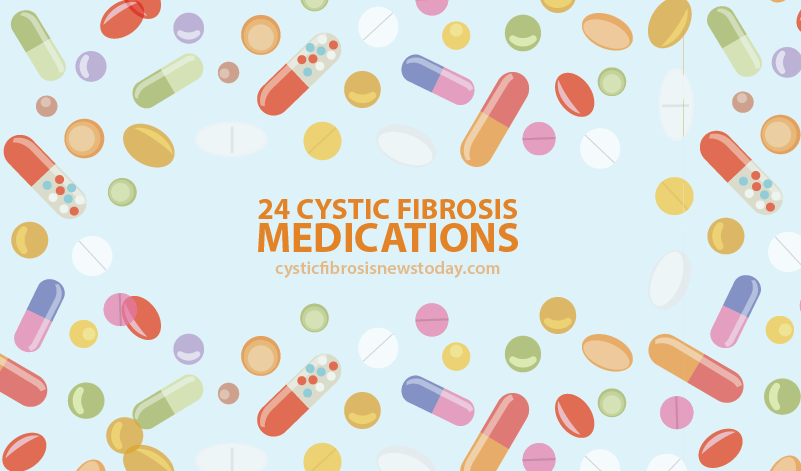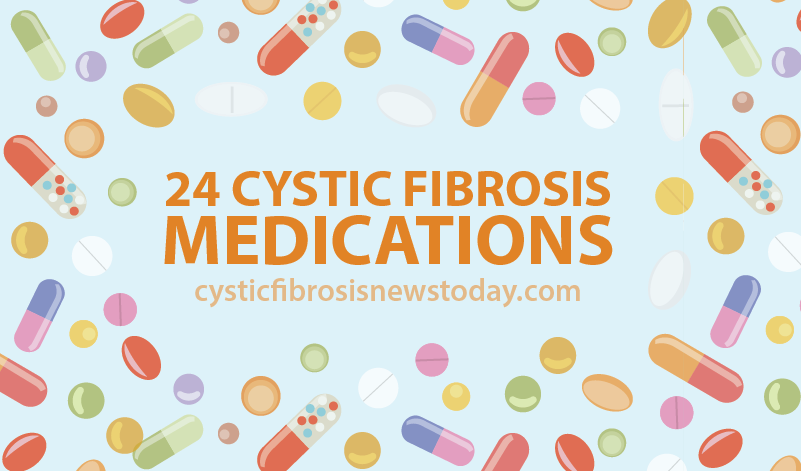24 Cystic Fibrosis Medications
Written by |


Cystic fibrosis is a life-threatening, genetic disease that affects patients’ ability to breathe and causes persistent lung infections. There is currently no cure for cystic fibrosis, but there are treatments designed to help patients maintain their health and have longer, more fulfilling lives. There are cystic fibrosis medications approved for patients with the disease, but treatment plans are unique and tailored to each patient’s specific health characteristics and needs. The range of cystic fibrosis medications includes CFTR modulators, enzyme supplements, mucolytics, antibiotics, and vitamins.
CFTR Modulators for Cystic Fibrosis
The Cystic Fibrosis Transmembrane Conductance Regulator (CFTR) is a protein which regulates the proper flow of chloride and sodium (salt) in and out of cells lining the lungs and other organs. Patients who suffer from cystic fibrosis have mutations in the gene that provoke a malfunction of the CFTR protein, which is why patients usually suffer from a buildup of thick mucus, persistent lung infections, pancreatic damage, and complications in other parts of the body. CFTR modulators are the main course of treatment for cystic fibrosis and include:
1. Ivacaftor (Kalydeco)
2. Ivacaftor / Lumacaftor (Orkambi)
In March, the U.K. National Institute for Health and Care Excellence (NICE) issued a draft guidance against recommending Orkambi (lumacaftor-ivacaftor) for treating cystic fibrosis (CF) since its cost is too high for the low benefits it brings.

Enzymes to Treat Cystic Fibrosis
According to the Cystic Fibrosis Foundation (CFF), 87% of the patients who suffer from cystic fibrosis need to take enzymes. These supplements are taken in the form of capsules through the mouth so they can work in the intestines. Each capsule has small beads with digestive enzymes and is covered with a special enteric coating. It is important that patients take the right amount of enzymes, and should check with the dietitian on their CF care team for the exact amount of enzymes to take. Enzymes help patients digest carbohydrates, proteins and fats; gain and maintain a healthy weight; and absorb essential nutrients such as vitamins and minerals. Enzymes for patients with cystic fibrosis include:
3. Pancrelipase (Cotazym, Cotazym-S, Creon, Dygase, Ku-Zyme, Ku-Zyme HP, Kutrase, Lapase, Lipram, Lipram UL, Palcaps 10, Pancrease MT, Pancreaze, Pancrecarb MS, Pangestyme CN 10, Pangestyme EC, Panocaps, Panocaps MT 16, Panokase, Pertzye, Ultrase, Viokace, Viokase, Zenpep)
4. Pancreatin (Hi-Vegi-Lip, Pan-2400, Pancreatin 4X)
Here’s 10 Cystic Fibrosis Channels You Must Follow

Mucolytics for Patients with Cystic Fibrosis
Mucolytics is a category of cystic fibrosis medications for the treatment of the disease designed to help thin the mucus in the lungs so that patients can cough and expel it more easily. It cuts up the DNA strands outside the cell that are responsuble for making CF mucus thick and sticky. These strands are formed in white blood cells and are able to fight lung infections. By getting the mucus out of the lungs, the damage caused by chronic lung infections is delayed. The class of mucolytic medications include:
5. Dornase alfa (Pulmozyme)
6. Hypertonic saline
Antibiotics to Help Cystic Fibrosis Patients
Lung infections are particularly common among patients with cystic fibrosis and antibiotics are used to fight or control infection-causing bacteria. Therefore, antibiotics are an important part of regular care for CF patients. There are oral antibiotics (liquids, tablets or capsules to be swallowed), intravenous (IV) antibiotics (liquid medicine administered directly into the blood through an IV catheter), and inhaled antibiotics (an aerosol or mist inhaled directly to the airways). The antibiotic drug, the dosage, and the time of treatment depend on the patient and infection, but the options include:
7. Tobramycin inhalation solution (TOBI, Bethkis)
8. Aztreonam for inhalation solution (Cayston, Azactam)
9. Tobramycin inhalation powder (TOBI Podhaler)
10. Azithromycin (Zithromax, Zmax)
11. Amikin (Amikacin)
12. Gentamicin (Garamycin)
Did you know that children and women are faster breathers than men as their breathing rate is higher? Learn other curious facts about the lungs here.

Vitamins to Ease the Cystic Fibrosis Symptoms
Vitamins can help the bodies of patients with cystic fibrosis to gow, function better, and fight infections. While vitamin A is used to improve vision, bone and tooth formation, cell function, and immunity, vitamin D helps build and maintain strong bones and teeth. Vitamin E is particularly important for CF patients as it is an antioxidant that protects compounds in the body from combining with oxygen, keeping red blood cells healthy and helping to fight infections. In addition, vitamin K helps blood clot and maintain the health of the bones.
13. Alpha E
14. Amino-Opti-E
15. Aqua Gem-EAqua-E
16. Aquasol E
17. Aquavite-E
18. Centrum Singles-Vitamin E
19. E Pherol
20. E-400 Clear
21. E-600
22. E-Gems
23. Nutr-E-Sol
24. Vita-Plus E Natural
Cystic Fibrosis News Today is strictly a news and information website about the disease. It does not provide medical advice, diagnosis or treatment. This content is not intended to be a substitute for professional medical advice, diagnosis, or treatment. Always seek the advice of your physician or other qualified health provider with any questions you may have regarding a medical condition. Never disregard professional medical advice or delay in seeking it because of something you have read on this website.





